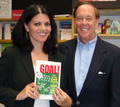We've all been in a position where we wished we could take back what we said. In the case of an interview, the implications are huge in that saying the wrong thing could eliminate you as a candidate.
Having conducted literally thousands of interviews, we've come up with a list of things to avoid saying:
Didn't think you'd ask me that - If it's on your resume, be prepared to discuss it. Many candidates make the mistake of thinking they won't be asked about a certain experience - either because it's old or not as relevant as other things on their resume.
Before I answer that... - This is perhaps one of the most frustrating things to hear if you're an interviewer. You've asked a question and instead of answering it, the candidate wants to tell you something, either as a preamble to the answer or something entirely unrelated. Both are mistakes.
Here's my philosophy - If you're asked about your philosophy, then it's perfectly fine to give it. What we see too much of are candidates who focus on generalities and their philosophy rather than speaking about their specific experience. People get hired because of the experience they've had, not their views on how things should be done. After all, the best predictor of future behavior (and accomplishments) is what has happened in the past. Always talk specifics.
I'm a big picture person - There isn't a strategic position out there that doesn't require some level of "doing." Being a big picture person is important, but letting the interviewer know how you implemented that strategic vision is key to them envisioning you in the new role.
My boss and I never got along - It's impossible for someone to get along with everyone, but when you are discussing your relationship with a previous boss, it's never wise to discuss whatever negatives passed between the two of you. If you and your boss had different styles of working, you can talk about how you turned those differences into a positive.
Let me tell you one more thing - When the interviewer thanks you for your time, the interview has ended. Many candidates make the mistake of believing that they have a few more minutes to discuss some things that they want the interviewer to know. Recognize that when the interviewer brings the interview to a close, it's your cue to shake their hand and thank them for their time. No more selling after the handshake.
I did this and I did that - The lack of "we" in your answers can hurt your candidacy. What interviewers like to hear is how candidates are able to work collaboratively with other areas of the organization. The ability to draw the best efforts from others when they are working on your project will mark you as a team player. No project succeeds on the efforts of just one person and to imply that you were the only reason for its success will work against your candidacy.
Do you think I'm right for this job? - By asking this question you put the person on the spot, particularly if they do not believe you are the best candidate. Most interviewers like to collect their thoughts after an interview and mentally review the answers they heard over the course of an hour or so. Give the interviewer the courtesy of time to reflect on the interview and perhaps meet with others on the interview team to come to a conclusion.
Who am I up against? - While you may be curious about your competition, it is never appropriate to ask the interviewer this question. Anyone interviewing for a new job has the right to confidentiality.
What's the compensation? - If you are interviewing for just about any position, there will be a salary range within which your salary could lie. Don't ask this question of the interviewer because s/he probably does not know at that point if you are going to be offered the position, let alone what compensation you might be offered. Impress the interviewer, become their #1 choice for the position and then you can deal with the compensation question.
The best way to impress an interviewer is by knowing what to say and what not to say. You can't unring a bell.
Fred Whelan & Gladys Stone
Whelan Stone
Executive Search and Coaching
Authors of GOAL! Your 30 Day Career Plan for Business & Career Success
Gladys Stone and Fred Whelan are executive coaches and recruiters with more than 20 years of experience. Their company, Whelan Stone www.whelanstone.com, was founded in 1999 and works primarily with Fortune 500 companies, recruiting high-impact talent and boosting the performance level of management. Their book, “GOAL! Your 30 Day Game Plan for Business & Career Success” www.goalyour30daygameplan.com delivers a practical, effective solution for reaching any business or career goal. They have been frequently quoted in the Wall Street Journal, Fortune magazine, USA Today and the Boston Globe and author a career blog on The Huffington Post and write articles for the career site Monster. Both live in San Francisco.

Post new comment
Please Register or Login to post new comment.